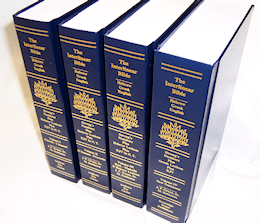Textus Receptus Bibles
Jay P. Green's Literal Translation 1993
| 41:1 | And it happened in the seventh month, Ishmael, the son of Nethaniah, the son of Elishama, of the royal seed, and of the chief ones of the king, and ten men with him, came to Gedaliah, the son of Ahikam, to Mizpah. And they ate bread together there in Mizpah. |
| 41:2 | And Ishmael, the son of Nethaniah, and the ten men with him rose up and struck Gedaliah, the son of Ahikam, the son of Shaphan, with the sword. And they killed him whom the king of Babylon had appointed over the land. |
| 41:3 | Ishmael also struck all the Jews who were with him, with Gedaliah at Mizpah, and the Chaldeans who were found there, the men of war. |
| 41:4 | And it happened, the second day after he had killed Gedaliah; and no one knew, |
| 41:5 | men from Shechem came from Shiloh, and from Samaria, eighty men, having their beards shaved, and their clothes torn, and having cut themselves, and with offerings and incense in their hand, to bring to the house of Jehovah. |
| 41:6 | And Ishmael, the son of Nethaniah, went out from Mizpah to meet them, walking as he walked and weeping. And it happened, as he met them, he said to them, Come to Gedaliah, the son of Ahikam. |
| 41:7 | And it happened when they came into the middle of the city, Ishmael, the son of Nethaniah, killed them, he and the men with him, throwing them into the middle of the pit. |
| 41:8 | But ten men were found among them who said to Ishmael, Do not kill us, for we have treasures in the field, of wheat, and barley, and oil, and honey. So he held back, not killing them with their brothers. |
| 41:9 | And the pit there in which Ishmael had thrown all the dead bodies of the men, whom he had struck because of Gedaliah, was the one which Asa the king had made from the face of Baasha, king of Israel. Ishmael, the son of Nethaniah, filled it with the slain. |
| 41:10 | And Ishmael took captive all the rest of the people who were in Mizpah, the king's daughters, and all the people who stayed in Mizpah, whom Nebu-zaradan, the chief of the executioners, had entrusted to Gedaliah, the son of Ahikam. And Ishmael, the son of Nethaniah, took captive and went to go over to the sons of Ammon. |
| 41:11 | But when Johanan, the son of Kareah, and all the army commanders with him, heard of all the evil that Ishmael, the son of Nethaniah, had done, |
| 41:12 | then they took all the men and went to fight with Ishmael, the son of Nethaniah. And they found him by the great waters that are in Gibeon. |
| 41:13 | And it happened when all the people with Ishmael saw Johanan, the son of Kareah, and all the army commanders with him, then they were glad. |
| 41:14 | And all the people that Ishmael had taken captive from Mizpah turned around and came back, and went to Johanan, the son of Kareah. |
| 41:15 | But Ishmael, the son of Nethaniah, escaped from Johanan with eight men, and went to the sons of Ammon. |
| 41:16 | Then Johanan, the son of Kareah, and all the army commanders with him, took all the remnant of the people whom he had recovered from Ishmael, the son of Nethaniah, from Mizpah (after he had killed Gedaliah, the son of Ahikam), mighty men of war, and the women, and the children, and the eunuchs, whom he had brought again from Gibeon. |
| 41:17 | And they departed and lived in the inn of Chimham, which is by Bethlehem, to go to enter Egypt, |
| 41:18 | because of the Chaldeans; for they were afraid of them, because Ishmael, the son of Nethaniah, had struck Gedaliah, the son of Ahikam, whom the king of Babylon had appointed in the land. |

Green's Literal Translation 1993
Green's Literal Translation (Literal Translation of the Holy Bible - LITV), is a translation of the Bible by Jay P. Green, Sr., first published in 1985. The LITV takes a literal, formal equivalence approach to translation. The Masoretic Text is used as the Hebrew basis for the Old Testament, and the Textus Receptus is used as the Greek basis for the New Testament.
Green's Literal Translation (LITV). Copyright 1993
by Jay P. Green Sr.
All rights reserved. Jay P. Green Sr.,
Lafayette, IN. U.S.A. 47903.